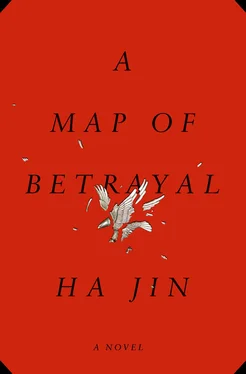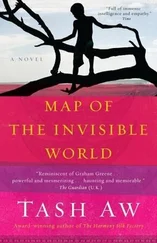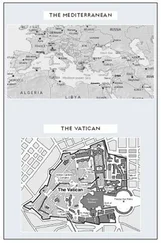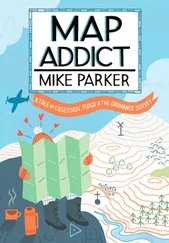“I didn’t take them into account,” I admitted.
“You met them and saw how well they were doing in a godforsaken town. Do you think they could succeed like that just on their own? There’ve been powerful hands helping them ever since I started in my profession. If I betray my country, those hands can also destroy them.”
“What should you do?”
“That’s the question I’ve been grappling with these days. My business here is worth one and a half million dollars. It was the Chinese government’s investment. If I surrender to the FBI, the business will be gone and I’ll be blamed for the loss. Worse yet, I’d have to give the FBI a lot of information on Chinese espionage operations, especially in North America. Then to China I’ll become a criminal guilty of high treason.”
“Why can’t you reverse the roles of the plaintiff and the accused? Why is a country always innocent and always right? Hasn’t China used both you and your grandfather relentlessly? Hasn’t your country betrayed you?”
He looked astonished, his eyebrows locked together. I continued, “Ben, things have been changing in China, where many people no longer depend on the state for their livelihood and survival. If your family’s economic situation takes a downturn, I can send them money regularly. So for now, just think about what will be the best for you and Sonya.” I had to mention money to fully convince him that his family’s survival might not depend on the state anymore.
“Thank you, Aunt Lilian! This means a great deal to me. With your help I’ll have my rear base covered. I will figure out a way.”
He didn’t go to sleep for a long time after I switched off the lights. He tossed and twisted in the bed close to the window, now and again letting out a faint sigh. My promise must have set his mind racing.
We checked out of the motel the next morning and drove into the city. It took just fifteen minutes to get to Chinatown. I liked Montreal for its easy traffic. After parking in an outside lot, we headed to Saint-Urbain Street, where Kam Fung was. No sooner had we sat down at a corner table than Suzie appeared, using a cane that had a thin leather strap attached to it. She was much frailer and more bent than ten months before and might have suffered from rheumatism and osteoporosis. Ben and I stood, he drew up a chair, and we sat her down. I hung her cane on the back of the chair. She took out a Kleenex and blew her nose. She tried to smile, but her effort only made her face look sickly. Her eyes were watery, the lower lids a little swollen.
I said, “Are you under the weather, Suzie?”
“No, it’s just the withdrawal symptoms.”
“Withdrawal from what?” I asked.
“Caffeine. I just quit coffee.”
“Why did you do that?” The thought came to me that she might not have many years to live.
“I want to put my life together again.”
“Have you been dating someone?” I asked in earnest.
“Get out of here!” She cackled. “I quit sex long ago. I just want to live longer. When I was young, I thought I’d die before sixty, and I wouldn’t mind that as long as I was happy when I was alive. But since I turned sixty, somehow the older I get, the longer I want to live. Guess I’ve got greedy.”
“That’s natural,” I said. “Life has become more precious to you.”
“What a smart girl. That’s why I like you much more than your mom.”
Ben poured her a cup of jasmine tea and said, “Here, drink this, Grandaunt, and you’ll feel better.”
Indeed, a few swallows later she returned to normal, relaxed with her legs folded under her. She grinned, and her face creased, showing a coating of makeup. She glanced sideways at Ben, blinking her eyes, which had lost their almond shape and were almost triangular now. “He’s handsome like your dad,” she said about Ben.
“You bet,” I agreed. “He’s also smart like him.”
We ordered lunch. Suzie wanted only a bowl of wontons, saying she wasn’t hungry and was happy just to see us. Indeed, she’d been beaming nonstop. We resumed making small talk.
When our food had come, I said to Suzie, “One question has been on my mind since we last met. How come my dad left his diary with you?”
“Gary had a feeling that something bad might happen to him. He told me to say nothing about his secret profession to the investigators. Just play the fool and deny knowing anything. He wanted me to keep the diary and let nobody know of its existence. He had a sixth sense for danger.”
“He wanted you to pass it on to me?”
“He said nothing like that, but I assumed that could be his intention. Also, the diary could have become criminal evidence, so he wouldn’t want the FBI to get hold of it.”
“Grandaunt Suzie,” Ben joined in, “one thing I can’t figure out about my granddad — why did he commit suicide? There must have been ways China could rescue him.”
“Baloney! China dumped him,” she said, twisting her mouth a little. “I got a note from Gary after he was in custody. He asked me to go to Beijing and beg Deng Xiaoping to swap some imprisoned U.S. spies for him.”
“You received a letter from him?” I was so surprised that I put down my soup spoon.
“Yes, it came to me through the mail.”
“How could he send you the letter from prison?” Ben asked.
“It’s beyond me too. Guess there must’ve been a secret agent who smuggled the letter out of jail and dropped it into the mailbox. Or someone who visited Gary might have brought it out for him. In any event, the letter reached me without a glitch. So I went to Hong Kong right away and got in touch with Bingwen Chu, Gary’s handler, who helped me cross the border into China. In Beijing I asked some officials to let me speak to Deng Xiaoping personally.”
“Did you get to?” Again I was taken aback.
“Of course not. There was this man named Ding, a big shot in the Ministry of National Security. He received me in his office, but no matter how I begged, they wouldn’t try to rescue Gary.”
Ben put in, “That must have been Hao Ding, the minister of national security. He was in charge of China’s intelligence service in the eighties. What did he tell you, Grandaunt?”
“He said his country had nothing to do with Gary Shang anymore. To them, Gary was a traitor, a blackmailer. Ding told me, ‘He just extorted seventy thousand dollars from our country. What kind of money is that? Let me give you an idea: I make only two hundred dollars a month. That’s thirty years’ salary for me.’ Another man jumped in, ‘Gary Shang got rich in the U.S. He was rolling in cash and always drove a Buick, but he was corrupted by capitalism, greedy like a snake that wants to swallow an elephant.’ The same man went on to say that Gary even had a bourgeois disease, because anyone who ate coarse grains and vegetables every day wouldn’t suffer from diabetes. I realized there was no way I could reason with them, so again I asked to see Deng Xiaoping in person. They laughed in my face, saying I was out of my senses and that Chairman Deng had no time for such a trifle. I got furious and yelled at them.
“Seeing me distraught, Ding revealed to me, ‘To tell you the truth, there’s no need to make such a futile attempt. Chairman Deng was well informed of Gary Shang’s case and already gave instructions: “Let that selfish man rot in an American prison together with his silly dream of being loyal to both countries.” So Gary Shang blew his chance and the case is closed. Nobody can help him anymore.’ Those were the final words I got from them.”
“Then you came back and told my father that?” I asked.
“No, I wasn’t a family member and couldn’t go to the jailhouse to see him. Someone else must have passed the message on to him.”
Читать дальше











